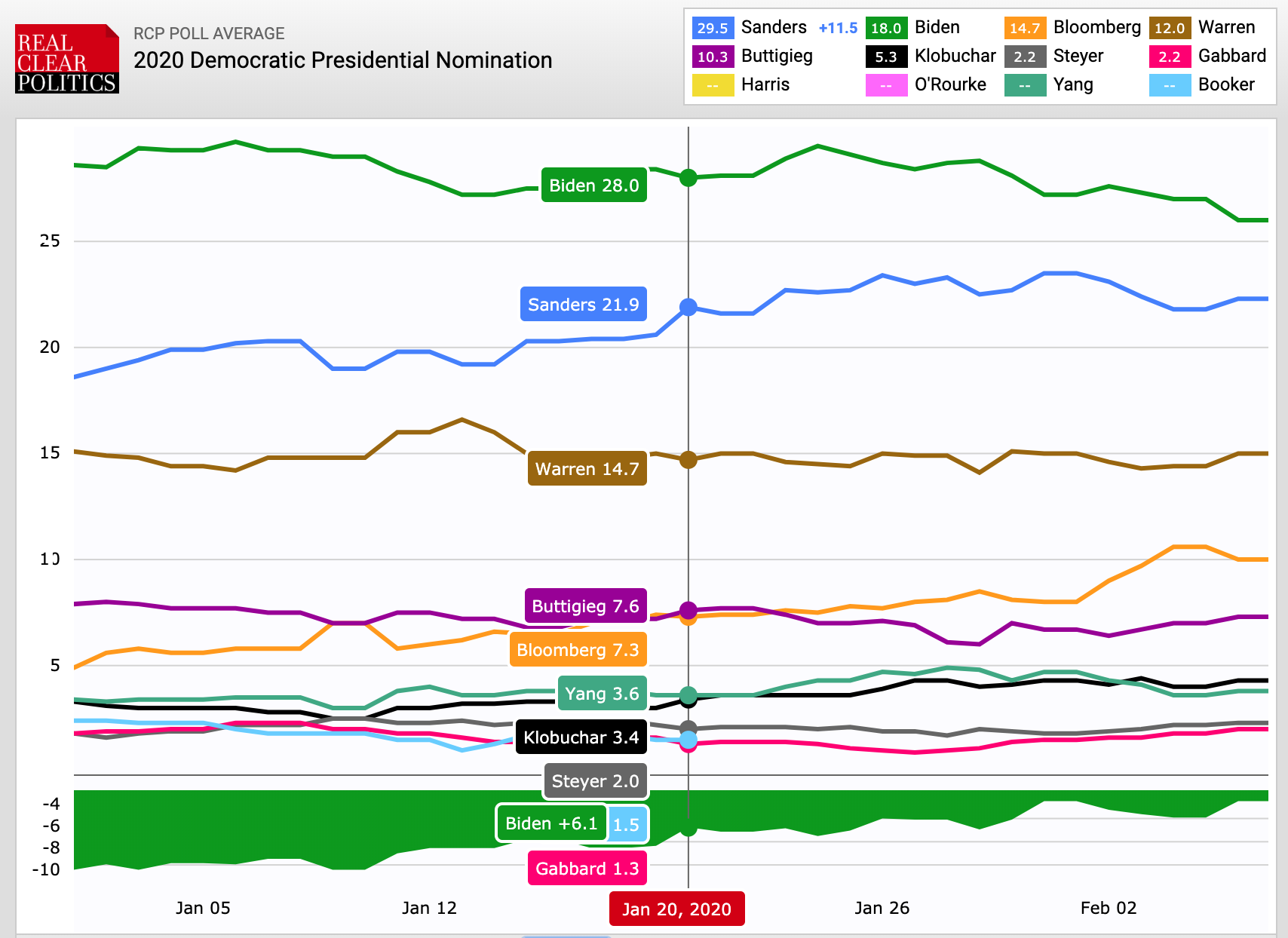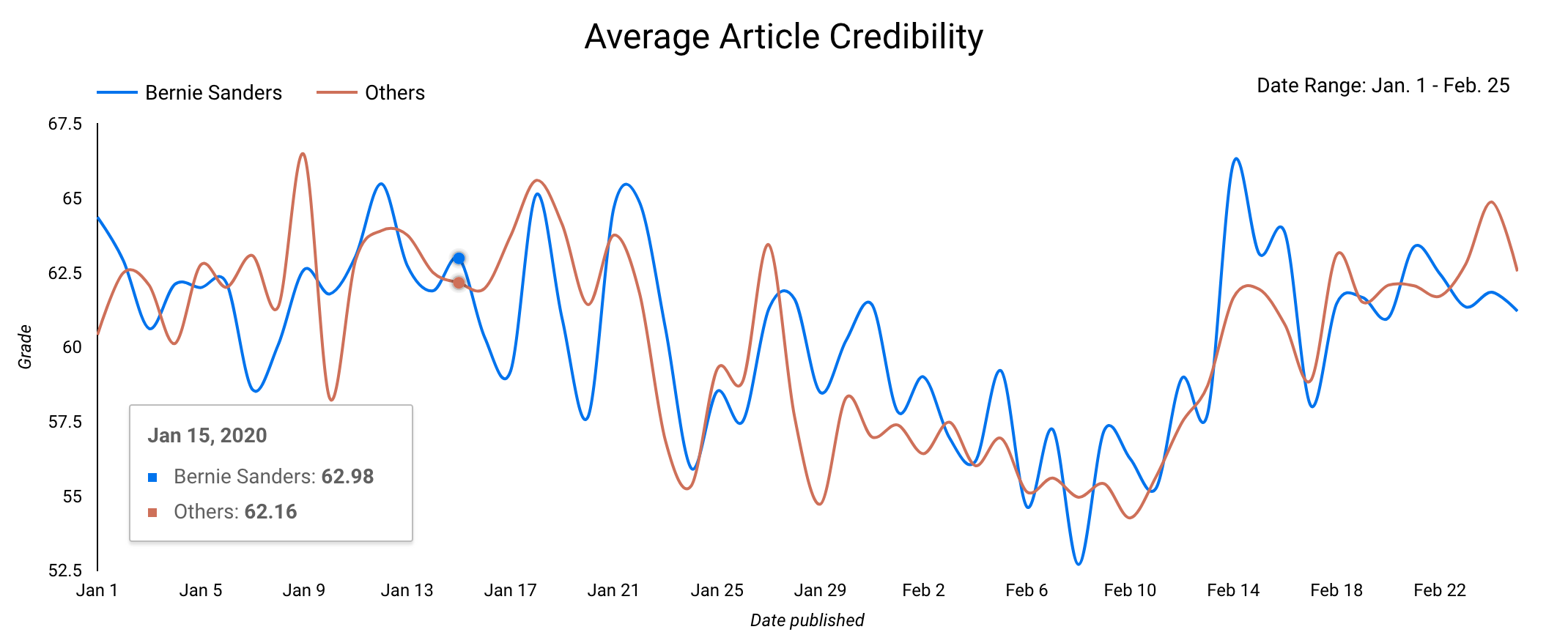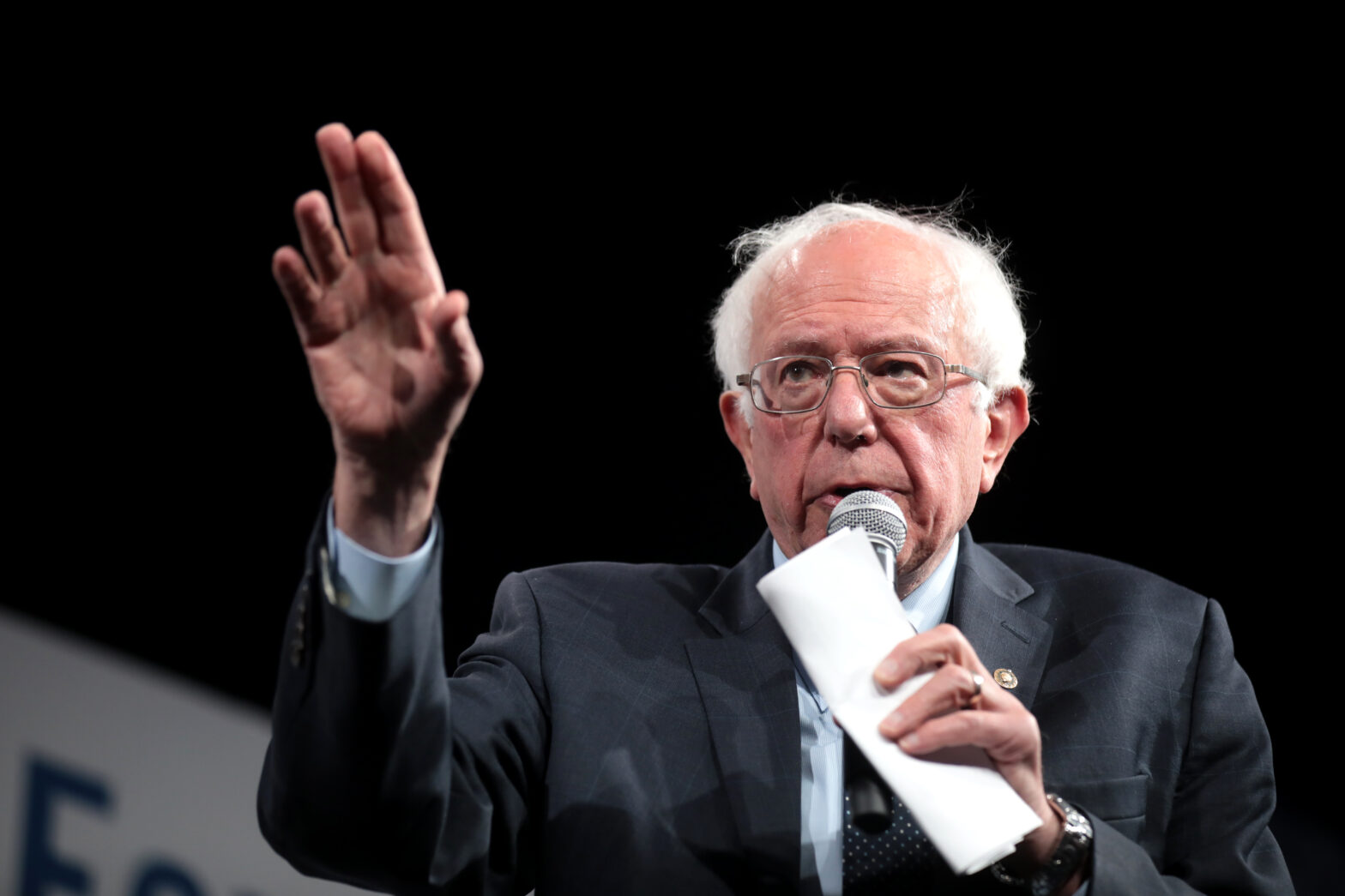Before claims of a #WarrenMediaBlackout, Sanders supporters decried a Bernie Blackout, whereby the media was downplaying positive results for Sanders (a claim that also arose in 2016). This election season, any such blackout dissipated by the end of 2019 and further reversed following his strong performances in early primaries. But the question remains: is Sanders getting fair media treatment?
In terms of fairness, we want to look specifically at whether the amount of coverage Sanders receives is proportionate to his polling position and whether that coverage is any more or less credible than coverage of other candidates.
We used two different approaches to explore this. First, we compared the number of articles about each candidate with their national polling average over a set time period. Second, we used our database on article credibility (based on site, author, sources, and writing tone) to grade articles about each candidate. Whether coverage is positive or negative is unimportant to us — what matters is whether coverage is based on facts.
To our surprise, our data (based on 6,000 articles from Jan. 1 to Feb. 6) suggests that the media in early 2020 has been talking about Sanders more, not less, than would be commensurate with his polling position. Furthermore, looking at over 11,000 articles from Jan. 1 through Feb. 25, Sanders gets the same treatment as other candidates in terms of the credibility of news coverage, which is to say that it’s all rather mediocre.
This appears to run counter to the supposed narrative that establishment Democrats, fearful of a Sanders nomination, are leveraging media coverage to slow his momentum. While there are certain events that provide fuel for this narrative — like this week’s uproar over Cuba — coverage of him has not thus far broadly slid toward conjecture and slander.
Please check your email for instructions to ensure that the newsletter arrives in your inbox tomorrow.
Is the Bernie Blackout Really Over?
Between January 1 and February 6, the top six major candidates had fairly consistent polling positions, so we set out to compare the amount of media coverage for each candidate to their national polling averages. Though candidate popularity and media coverage do not always follow one another, this measure serves as a useful baseline from which to explore candidates’ actual level of coverage.
National Polling Averages (Jan. 1-Feb. 6)

Graph from RealClearPolitics
In looking at six of the most popular U.S. outlets (Breitbart, CNN, Fox News, New York Times, Washington Post, and Washington Examiner), Sanders was the subject of anywhere between 35% (CNN) and 59% (New York Times) more articles than would be proportional to his national polling average. For example, despite polling at roughly 21.5%, Bernie was the subject of a third of all output from Fox News about the presidential candidates. This data is only for these six outlets, but is suggestive of a wider trend.
So not only is the Bernie Blackout over, but it looks like outlets are training their spotlights on Sanders, for better or for worse.
Is Bernie’s coverage credible?
One of the grievances for Bernie supporters has been the tone of his media coverage. Our data captures not just the quantity of coverage but also the quality, and one of those measures involves our algorithm gauging the opinionatedness of the writing, all in an effort to get news that is objective rather than positive or negative. On this account our data does not suggest any divergence between the credibility of his news coverage and that of the other candidates.

We looked at all articles in our dataset on coverage of the Democratic candidates between January 1 and February 25. Articles about Sanders actually had a slightly higher average credibility (60.3%) than the average for all other candidates (59.6%), not to mention a higher average than any of the other top six candidates. This means articles about Sanders, at least in this time period, are no less credible, resourced, or factual than articles about the other candidates. In fact, they might be slightly more so.
Please check your email for instructions to ensure that the newsletter arrives in your inbox tomorrow.
What about Cuba?
This week, the media worked into a frenzy over Sanders’ comments on Cuba, during which he disavowed the Castro regime but argued that it implemented an effective literacy program.
“We’re very opposed to the authoritarian nature of Cuba but you know, it’s unfair to simply say everything is bad. When Fidel Castro came into office, you know what he did? He had a massive literacy program. Is that a bad thing? Even though Fidel Castro did it?”
Quite surprisingly, articles about Sanders’ Cuba remarks did not take a hit in credibility, despite the suggestive nature of headlines like “Bernie Sanders’ defense of Castro’s Cuba evokes socialism’s brutal history.” Articles about this incident (scoring an average of 63.4%) actually tended to outscore the overall average for articles about the candidates thus far this year.
While this means articles about Bernie may not be the rampant slandering that some suggest, that average score is still not very high, and the risk of misinformation is constant. Finding expert, unbiased coverage of what the candidate actually said is critical to getting the whole story.
One option is to seek out highly credible articles like this one from NBC News (84%). It ranks highly because it has credible sources, cites experts on the topic, and talks matter of factly about the issue:
“Although there were improvements in health care and education, the overall living standards, measured by gross domestic product, have declined during the past 60 years.”
“The last literacy estimate for pre-revolutionary Cuba is from 1953 when 76.4 percent of the population was literate, making it the fourth in the region, according to data analyzed by Carmelo Mesa-Lago, a professor emeritus of economics at the University of Pittsburgh and a leading expert on the Cuban economy. It moved to third place between 2005 and 2007.”
“Mesa-Lago says Sanders is basing his comments on figures from the 1980s when Cuba was heavily subsidized by the Soviet Union. In the 1990s, the Soviet Union collapsed, subsidies dried up, and the economy shrank by around 35 percent.”
“Cuba also led the region in low infant mortality rates pre-1959. It was ranked fourth in the 1950s and moved to third place in 2005 through 2007.”
Given Sanders’ ongoing success, further analysis of his coverage will be on our agenda. This may be sorely needed heading into Super Tuesday and beyond, as outlets continue to create output to corroborate any viewpoint, doubting his chances, generating alarm about his socialist tendencies, trumpeting his successes, and even projecting his victory in November.

